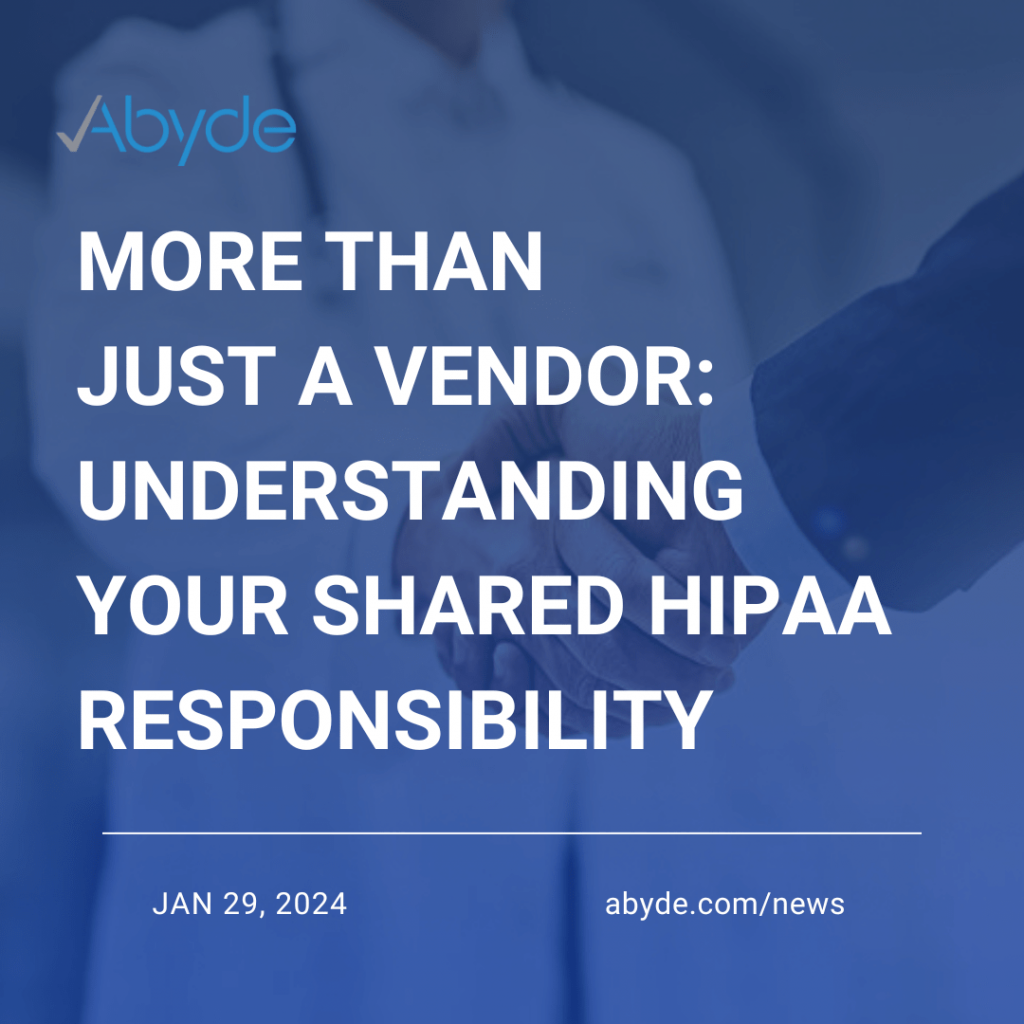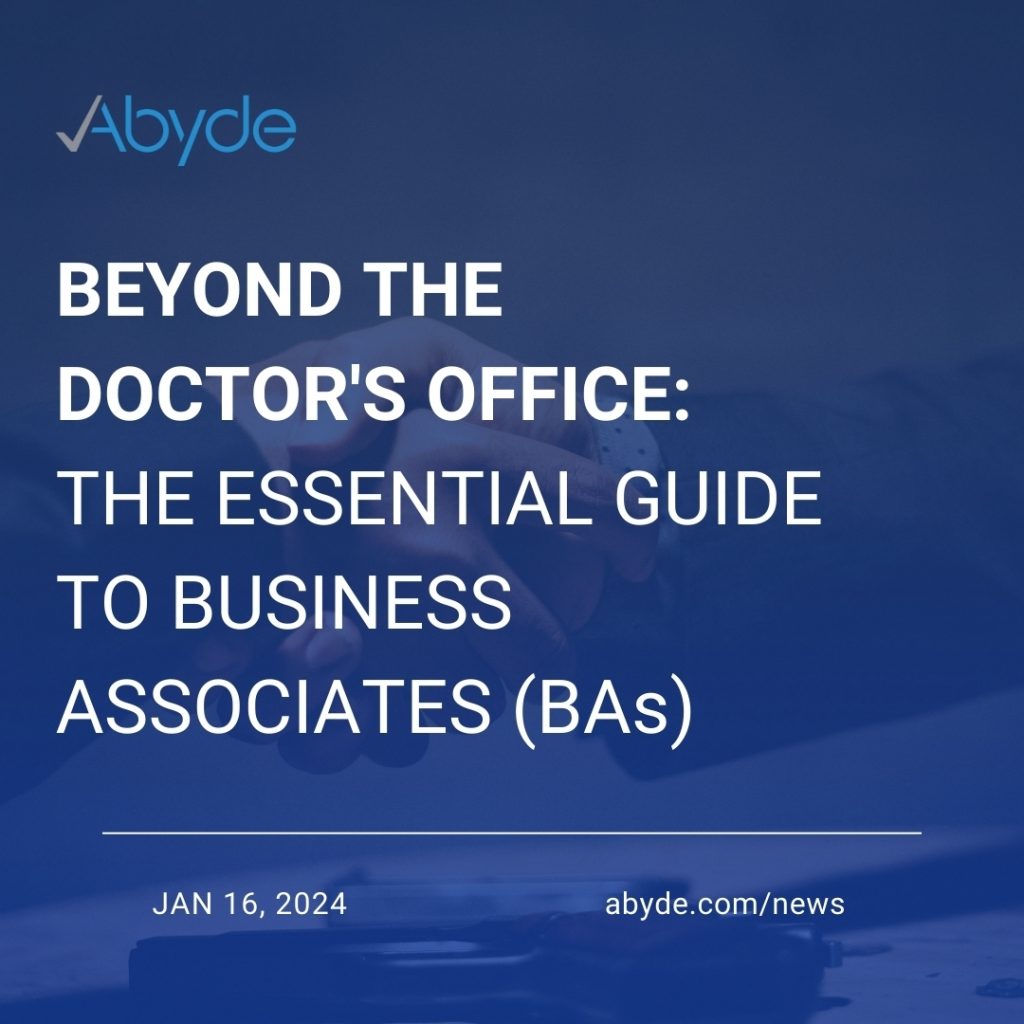February 6, 2024 Hey there, privacy protectors! Abyde here, your friendly neighborhood compliance champion, dropping some serious knowledge about Business Associate (BA) blunders. You know, those slip-ups that land you in hot water with HIPAA? Not a fun time at all. Here are some major lessons that BAs can learn from to ensure they continue to uphold their shared responsibility of protecting patient data. Proactive security is key: Assuming your company is immune to threats can lead to costly mistakes. Doctors’ Management Services faced this harsh lesson when they were part of a cyber attack and their files, which included protected health information, were infected with ransomware. DMS didn’t realize their files were affected for over a year. This infection isn’t something that can be quickly cured, with hacking organizations demanding money in exchange for access to files. The DMS’s delayed reactionary response teaches BAs what not to do. The DMS did not have an updated security risk assessment, policies and procedures in place, or security systems in place to be prepared for this ransomware attack. The OCR fined them a pretty penny, $100,000, for their negligence. This lesson was also the first fine based on a ransomware attack. Secure all servers: All protected health information, or PHI, a Business Associate interacts with, needs to be properly secure. While this seems obvious, BAs have learned this lesson the tough way, like MedEvolve’s $350,000 fine. MedEvolve had PHI online on an easily accessible server. This publicly accessible server included information like patient names, billing addresses, and even social security numbers. A similar fine also occurred to iHealth Solutions, an IT organization that did not properly secure access to a server that contained the PHI of over 250 patients. This mistake cost the company $75,000. Set up remote deletion of PHI: When working in a business, numerous devices have access to PHI. It is imperative to ensure data can be quickly wiped if these devices get into the wrong hands. A perfect example of this lesson was one learned by the Catholic Health Care Services of the Archdiocese of Philadelphia, which was fined $650,000. There was a theft of a CHCS employee’s phone that contained PHI. This phone had access to extensive PHI, including, social security numbers, diagnoses and treatments and patients’ families. Due to this stolen device, and no proactive measures to mitigate the detrimental impacts of theft, the CHCS was heavily fined and had to be monitored for two years. These fines may grab headlines, but the true cost goes beyond money. Breaches erode patient trust, damage reputations, and hinder the security of healthcare. Remember, BAs play a vital role in safeguarding sensitive information, and non-compliance has far-reaching consequences. While these fines serve as expensive lessons, Abyde is here to simplify compliance for your organization. Learn more about what it means to be a compliant Business Associate by emailing info@abyde.com and scheduling an educational consultation here.
More Than Just a Vendor: Understanding Your Shared HIPAA Responsibility
January 29, 2024 As a Business Associate (BA) in the medical field, you’re not just another cog in the machine – you’re a HIPAA hero, wielding the power to safeguard patient data and build trust within the healthcare ecosystem. You’re entrusted with access to Protected Health Information (PHI) while providing services to a covered entity, such as a hospital, health plan, or healthcare provider. This PHI can include everything from patient names and demographic information to diagnoses, treatment plans, and billing records. Think of yourself as a data guardian, a digital knight protecting the kingdom of PHI: But fear not, HIPAA hero! You’re not alone in this noble quest. We, at Abyde, are your trusty sidekick, and we will soon be offering the tools and support with our new software to turn compliance into your superpower. The software will provide: Remember, HIPAA compliance isn’t just a legal obligation, it’s a noble cause. By joining forces with Abyde, you can transform from “just a vendor” to a data defender, a patient advocate, and a true HIPAA hero. Ready to unleash your inner hero? Contact Abyde today at info@abyde.com and schedule a consultation here to get started! P.S. No cape required (but bonus points if you do).
The Truth Behind Teamwork: Choosing the Right Sub-Business Associate
January 26, 2024 At Abyde, we know that the medical world isn’t all scalpels and stethoscopes. It’s a whirlwind of paperwork, regulations, and let’s remember, actual patients needing top-notch care. That’s where trusty Business Associates (BAs) step in, taking care of billing, document disposal, IT services, and more, ensuring that medical staff can focus on patients. But even reliable Business Associates need to find the right medical Sub-Business Associates. Unsure what that entails? Don’t worry, Abyde has you covered! By seeking the right skills and qualities in Sub-Business Associates, and nurturing a supportive work environment, you can build a powerful team that elevates your organization to new heights. A reliable and skilled Sub-Business Associate is an investment in your success, ensuring the smooth operation and exceptional care that defines your commitment to patients. If you want to learn more about choosing the right sub-business associates, email us at info@abyde.com and schedule a consultation here.
Your Role in Protecting Patient Data
January 22, 2024 In the intricate healthcare ecosystem, patient data flows through a network of entities, each holding a piece of the puzzle. At the core are covered entities, like hospitals, clinics, and health plans, directly responsible for patient care and managing their Protected Health Information (PHI). Alongside them stand business associates, vendors and service providers who handle PHI on their behalf, performing crucial tasks like billing, claims processing, and data analytics. Both covered entities and business associates share a critical responsibility: safeguarding patient data with utmost vigilance. Breaches or misuse of this sensitive information can have severe consequences, eroding trust, damaging reputations, and potentially harming patients. So what exactly constitutes your role in this collective effort, depending on your position within the system? Unpacking the Roles: Sharing the Responsibility: Some vital roles Covered Entities and Business Associates play in data security include: Shared Accountability, Shared Success: Protecting patient data is a team effort. Covered entities and business associates must work together, hand-in-hand, to build a robust security ecosystem. This requires: Compliance is not just a box to tick; it’s a shared commitment to safeguard patient trust and privacy. By understanding their roles and responsibilities, both covered entities and business associates can lead as protectors of patients’ sensitive information. For more information on how you can ensure compliance, contact us at info@abyde.com and schedule an educational consultation here.
Beyond the Doctor’s Office: The Essential Guide to Business Associates (BAs)
January 16, 2024 In the healthcare world, data privacy reigns supreme. That’s where the Health Insurance Portability and Accountability Act (HIPAA) comes in, safeguarding sensitive patient information known as protected health information (PHI). But HIPAA’s reach extends beyond hospitals and doctors’ offices. Enter the business associate (BA): a vital player in the healthcare ecosystem, yet often shrouded in mystery. So, who exactly are BAs? Imagine a bustling healthcare landscape. Hospitals outsource billing services to companies, pharmacies rely on data analytics firms, and insurers partner with cloud storage providers. All these entities, if handling PHI, become BAs under HIPAA. In simpler terms, a BA is any person or organization that performs certain functions or activities involving PHI on behalf of a covered entity (healthcare providers, health plans, and clearinghouses). BAs sometimes are field-specific, like optometrists having eyeglass labs and OCT manufacturers. Dentists also have BAs like dental labs and equipment providers. Think of BAs as the supporting cast in the HIPAA play. They handle crucial tasks behind the scenes, ensuring smooth healthcare operations while keeping patient data secure. But with great responsibility comes great accountability. BAs are bound by the same HIPAA regulations as covered entities, meaning they must: Why are BAs important? BAs play a critical role in the healthcare industry’s efficiency and innovation. They allow covered entities to focus on patient care while outsourcing non-core activities. But more importantly, BAs contribute to a robust system of PHI protection, ensuring patient privacy and trust. The BA landscape is constantly evolving. With the rise of telehealth and cloud computing, new types of BAs are emerging. This highlights the need for ongoing education and awareness about BA responsibilities to maintain robust HIPAA compliance across the healthcare spectrum. Remember: Whether you’re a seasoned healthcare professional or a curious outsider, understanding BAs is crucial for navigating the complex world of HIPAA. By demystifying their role and responsibilities, we can work together to build a stronger, more secure healthcare system for everyone. So next time you hear the term “BA”, remember: they’re not just business associates; they’re essential allies in safeguarding patient privacy and ensuring a healthy future for HIPAA compliance. If you have any other questions on business associates, email us at info@abyde.com, or set up an educational consultation with one of our compliance experts.
Firewall Fireworks: iHealth Solutions Wrapped in $75,000 Worth of Red, White, and Blue Compliance Flags
June 28, 2023 The U.S. Department of Health and Human Services Office for Civil Rights (OCR) has decided to celebrate the 4th of July a bit differently this year. No, they’re not hosting a BBQ or a picnic. Instead, they’ve resolved a blazing inquiry with iHealth Solutions, a Kentucky-based firm providing a whole array of IT services to healthcare providers, including coding, billing, and onsite IT support. Like leaving the fireworks out in the rain before the big show, iHealth Solutions committed a significant faux pas by allowing the protected health information of 267 people to be as unguarded as a picnic basket at a bear convention. “HIPAA business associates must protect the privacy and security of the health information they are entrusted with by HIPAA-covered entities,” said OCR Director Melanie Fontes Rainer. “Effective cybersecurity includes ensuring that electronic protected health information is secure, and not accessible to just anyone with an internet connection.” In 2017, the sparklers were lit when a report emerged stating that iHealth Solutions had experienced an unauthorized transfer of protected health information from its unsecured server. This information wasn’t just your average email addresses and phone numbers – the information included confidential information, including patient names, birth dates, Social Security numbers, diagnoses, treatment information, and medical histories. The investigation detected a potential failure on iHealth Solution’s part to adequately assess risks and vulnerabilities to electronically protected health information across the organization. So, what’s the big *BANG* at the end of this fuse? A pretty hefty $75,000 civil monetary penalty, paid to OCR by iHealth Solutions. The company also agreed to a corrective action plan which includes several measures to ensure the protection of electronic protected health information. These steps include conducting a thorough analysis to identify risks and vulnerabilities, implementing a risk management plan, evaluating changes that affect the security of information, and revising HIPAA policies and procedures as required. As a finale, iHealth will be under the watchful eye of OCR for two years, ensuring its compliance with the HIPAA Security Rule. Abyde helps organizations avoid catastrophes precisely like this one. Abyde is like the super-organized neighbor who prepares for the 4th of July celebrations months in advance, ensuring everyone’s safety and enjoyment. They’re not in the business of barbecues and fireworks but rather in making HIPAA compliance as smooth and worry-free as a classic American apple pie. So, as we celebrate our independence this July 4, let’s remember that freedom should never come at the expense of our security, especially when it involves our personal health information. Here’s hoping your barbecues are hot, your fireworks are safe, and your servers are secure!
Outsourced Doesn’t Mean Overlooked
January 26, 2023 We get it. The hiring market is tough out there right now and when your main goal is providing the best experience for your patients, you will do whatever it takes to build a strong team. But before you go sailing the high seas to find your next hire, you might want to make sure they’re paddling in the same direction. Are you considering outsourcing job roles to agencies that employ individuals in other countries? A company’s location and where its employees are located doesn’t necessarily mean they are or are not HIPAA compliant. As a practice, you are responsible for checking the company’s policies and procedures of any company you hire to ensure that they comply with all relevant regulations. If an organization outsources any function that involves access to PHI, it must have a written contract with the Business Associate. Here are some questions we recommend asking prior to working with an outsourced company: Let’s make sure all eyes are on the same prize – HIPAA compliance. Still not sure if you’re asking the right questions? Give us a buzz and we will walk you through the most important processes and policies to follow.
OCR Drops Another HIPAA Fine, Business Associate Exposes 6 Million Records
September 23, 2020 The Office for Civil Rights has been dropping fines left and right in the last week, releasing their 7th (and largest) HIPAA settlement earlier today and bringing their running total to seven fines in just 8 days. The latest violation came with a hefty payout of $2.3 million as well as an extensive 2-year corrective action plan – and not to mention a whole lot of apology letters to write. The lucky winner of the latest HIPAA settlement is CHSPSC LLC, a business associate who serves a number of hospitals and clinics owned by Community Health Systems, Inc out of Tennessee. You may be thinking, “well no biggie, I’m a covered entity not a business associate so that wouldn’t be me,” but the 6 million+ patients affected and the reasons the OCR gave for levying a fine would beg to differ. Just like any covered entity might be, this business associate was the victim of a cyberattack that even after alarms were raised went unmitigated for months. As if that wasn’t enough, the OCR investigation discovered long standing non-compliance with the HIPAA Security Rule ultimately landing the business associate at the top of the most expensive 2020 fines list. On April 10, 2014, CHSPSC’s information system was infiltrated by a threat group that went unnoticed until the company was notified by the FBI 8 days later. The hackers continued to have a field-day, accessing the sensitive data for 4 months after the initial attack. CHSPSC’s continued disregard for implementing the necessary security protections required by HIPAA even AFTER receiving federal notice was described by OCR Director, Roger Severino, as “inexcusable”. The cyberattack affected 237 different covered entities served by CHSPSC and withdrew the PHI of 6,121,158 individuals including everything from names and birthdays to emergency contact information and social security numbers. As if over 6 million patients records being taken wasn’t bad enough, an OCR investigation into the business associate found several gaps in their compliance program including: It doesn’t matter whether you’re a healthcare provider, business associate, or just the average joe – falling victim to a cyberattack is fair game. Because business associates require the same HIPAA safeguard requirements as covered entities, no matter who gets hacked the OCR is looking for the same requirements and can hand out the same fines for either type of health related entity. For providers especially, entrusting your patients sensitive data to your business associates comes with added risks. In this case, 237 covered entities had to find that out the hard way. While there’s no way to be 100% in the clear from things like cyber attacks, having the proper business associate agreements in place at least takes the liability of an incident off your practice’s hands. If you had been one of those 237 entities affected here, lack of an agreement could have put your practice on the same chopping block as CHSPSC.
Who Qualifies as a Business Associate?
May 8, 2020 As a business owner, you know there are a lot of elements that go into running a successful healthcare practice. It’s common to have third-party companies assist with everything from accounting, to document disposal, to managing remote operations through cloud sharing and telehealth services. These vendors may be a big part of keeping your practice running smoothly. While you may already do a fantastic job of checking your contracts with these vendors – your terms of service, payments, etc. – where many practices fall short is in reviewing your vendor’s obligations to protect your sensitive patient information. As a healthcare provider, your practice functions as a covered entity, and any vendor that comes into contact with PHI in the process of working with your practice becomes a Business Associate (BA). Not all companies that your practice hires come into contact with PHI, so how do you know who exactly qualifies as a Business Associate? The HHS defines a Business Associate as any organization that creates, receives, maintains, or transmits PHI on behalf of a covered entity. Some examples of Business Associates include: Once you determine who is considered a Business Associate to your practice, you must then institute formal agreements to ensure your practice and your third-party vendors are properly protecting the security of your patient information. This agreement highlights the specific elements of HIPAA compliance that should be followed by both you and each of your Business Associates, including: Even if a vendor comes into contact with your PHI only once, it’s better to play it safe and have the proper agreements in place – just that one instance could be the catalyst for a breach of PHI. Not having the proper Business Associate agreements in place has been the cause of hundreds of HIPAA violations. One case, in particular, cost a medical practice in Utah a $100,000 settlement on top of a two-year corrective action plan. The practice filed a complaint against their EHR company who allegedly had been blocking access to patients’ ePHI. Although it might seem like the practice was a victim in this situation, the OCR found that there was no Business Associate Agreement in place – leaving the liability solely on the practice’s shoulders. Data breaches, cyber-attacks, and improper handling of PHI can happen to your practice at any time as well as the companies you work with – especially when operating remotely or bringing on new vendors to help manage operations. Ensuring that you have the proper agreements in place is vital in not only protecting your patient data but offsetting the liability of your practice in the case of a breach. A software solution like Abyde makes this process a whole lot easier with a Business Associate Portal that automatically generates formal agreements with all the proper policies and procedures in place – taking the stress of HIPAA compliance off you and your vendors.
Missing Business Associate Agreement with EHR Vendor Leads to $100,000 Fine
March 3, 2020 Announced today, a medical practice in Utah has come to a $100,000 settlement with the OCR for their failure to meet HIPAA requirements under the Security Rule. The practice of Steven A. Porter, M.D. received the $100,000 monetary settlement in addition to submitting to a corrective action plan over the next two years after a breach report led to the OCR’s investigation of the practice’s HIPAA compliance program. The investigation began after the practice filed a breach report regarding a complaint against a Business Associate of the practice’s EHR company. The Business Associate (BA) was blocking access to the practices’ patient’s electronic protected health information in exchange for $50,000 to be paid by the practice. While the original complaint was against the BA, once the investigation was initiated by the Office for Civil Rights, it was the practice that found themselves in the government’s crosshairs. Within the compliance review, the OCR had found that the practice had failed to do the following: Unfortunately for the practice, their lack of proper safeguarding and documentation of compliance cost them a hefty fine and put their patient’s PHI at risk. This breach, and corresponding financial settlement, highlights that even when working with typical healthcare vendors, such as EHR providers, the right Business Associate Agreements and HIPAA-compliant policies are required to prevent impermissible safeguarding or access to PHI. OCR Director, Roger Severino, included a statement in the HHS press release regarding the incident. “All health care providers, large and small, need to take their HIPAA obligations seriously, the failure to implement basic HIPAA requirements, such as an accurate and thorough risk analysis and risk management plan, continues to be an unacceptable and disturbing trend within the healthcare industry.” This fine follows a recent article highlighting the OCR’s focus on “low hanging fruit” and commitment to address an ongoing lack of HIPAA compliance among covered entities. As these violations continue to see costly outcomes, it is more important now than ever to ensure your practice has a full HIPAA program in place.









